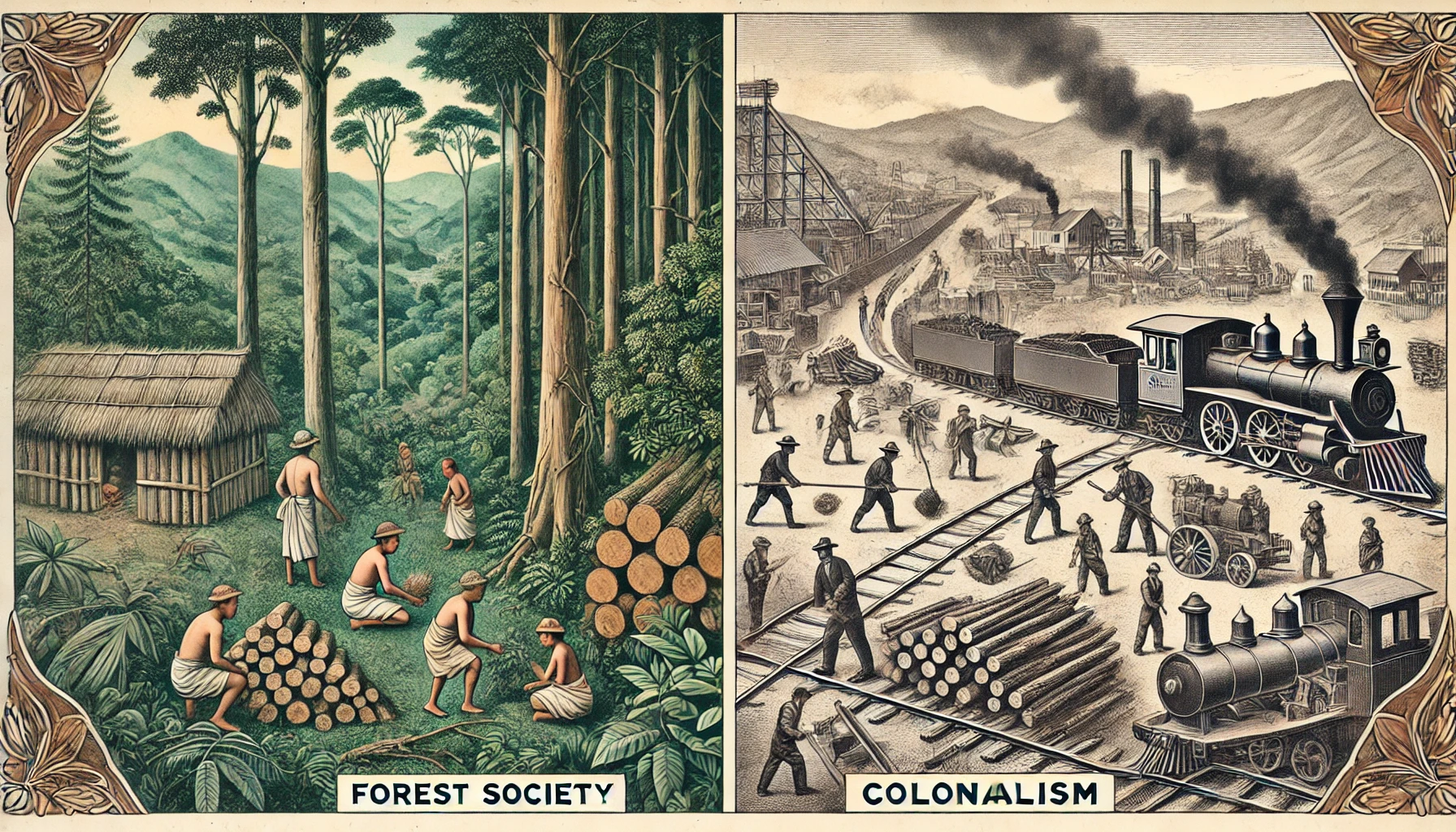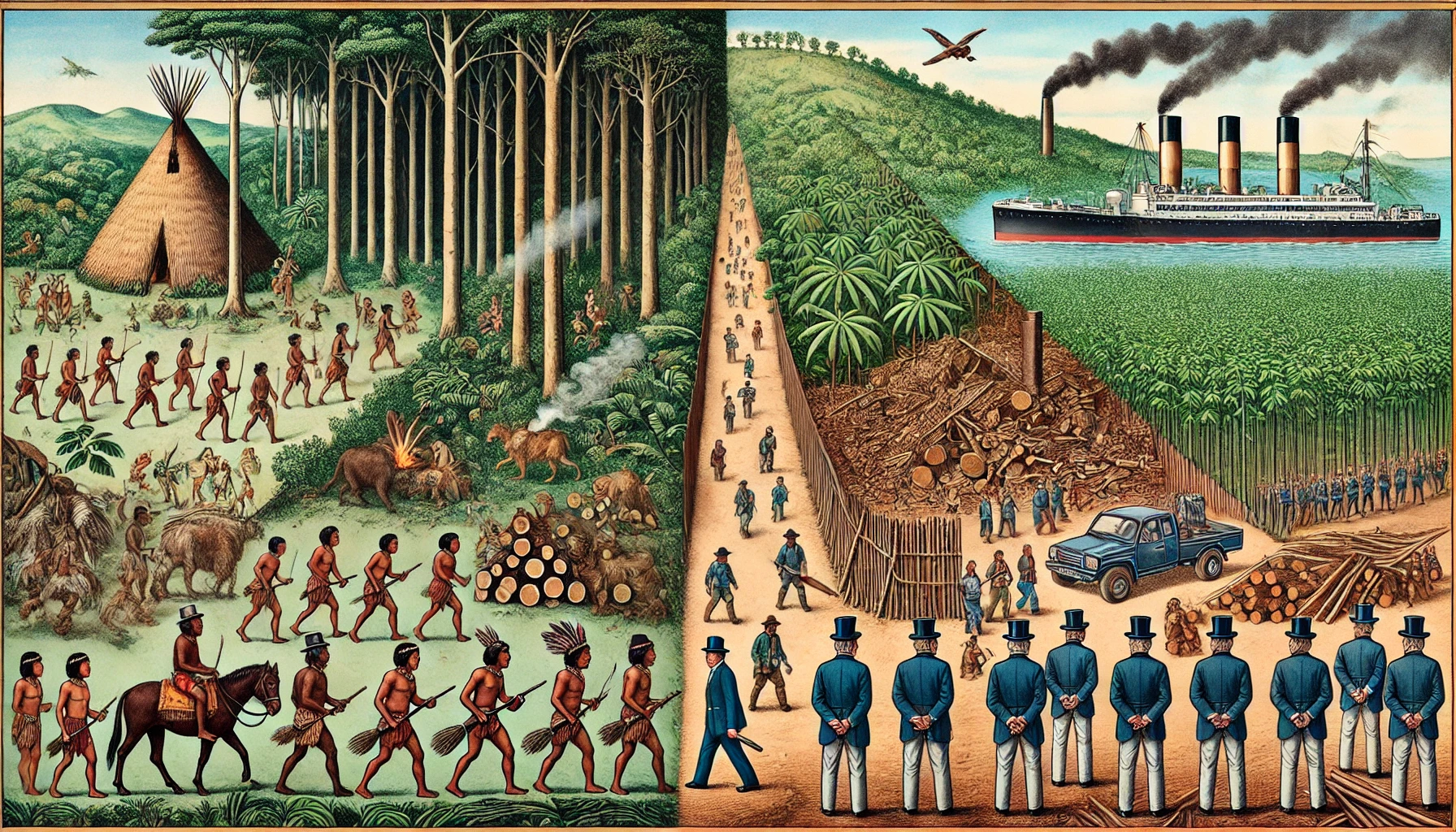




Forest Society and Colonialism: Summary, Key Concepts and Questions
Forest Society and Colonialism refers to the interaction between forest communities, their resources, and the colonial powers during European colonisation. This topic highlights how colonial powers exploited forests, reshaped ecosystems, and impacted the livelihoods of indigenous people. It also explains the resistance and adaptation of forest societies during this era.

What is Forest Society and Colonialism?
The term refers to the socio-economic and environmental changes brought about by colonial control over forests. Colonial powers considered forests as a resource for economic gain, leading to deforestation, the introduction of commercial plantations, and restrictions on local communities' traditional rights. Forest societies, which depended on forests for their livelihood, were forced to adapt or resist the new policies.
Deforestation Under the British Rule
During British rule, there was major deforestation in India. The problem of deforestation has become more complicated for some reasons. For a huge increase in population, the food demand increased and the cultivation area was extended by clearing forests. The British government started cultivating commercial crops for which they had to clear a huge forest area. These were the two main reasons for deforestation in the British period. They went for deforestation and increased the land for cultivation. Between 1880 and 1920, this deforestation occurred.
The Rise of Commercial Forestry
The British rulers restricted the overused forests by the Indians. They started it for the conservation of the forest. But later, they started using the forest for commercial purposes. The British rulers had requirements of wood and some commercial crops. They used the forest area for commercial crop cultivation, which increased the rate of deforestation. In 1865, they enacted the Indian Forest Act. After that, they introduced the term commercial forestry in 1878. By this act, the forest was divided into three areas- reserved, protected, and village forests.
Explanation of Forest Society and Colonialism
The British rulers restricted the forest area with the thought that the farmers are wasting the area by cultivation. Therefore, the British Government made a rule so that the forest areas are not destroyed. Though the forest area was preserved, the colonial Government started using it for their commercial purpose. Thus, the forest act and the forest society turned into colonialism. The British rulers were taking advantage of the forest society and colonialism for their commercial crop and wood production.
Forest Society and Colonialism Summary
Colonial Policies and Forests:
Forests were viewed as a source of revenue and strategic resources by colonial governments.
Laws like the Forest Act were introduced to regulate and control forests, often restricting local usage.
Impact on Forest Societies:
Indigenous communities lost access to forest resources, impacting their traditional livelihoods.
Many communities resisted these changes through revolts and uprisings.
Commercial Exploitation:
Large-scale deforestation occurred for timber extraction, railway construction, and commercial plantations (e.g., teak and rubber).
Wildlife and biodiversity suffered due to the destruction of natural habitats.
Resistance Movements:
Forest communities often resisted colonial policies, such as the Santhal rebellion and Gond uprisings, which were attempts to reclaim their rights.
Forest Society and Colonialism Questions and Answers
1. What Were the Main Reasons for Deforestation in India?
Solution: The main reasons for deforestation in India were the increasing population, huge food demand, commercial crop and wood production, etc.
2. Name the Categories of Forest Area.
Solution: In 1878, the forest act was enacted. According to this act, the forest area was divided into three parts, which are protected forests, reserved forests, and village forests.
3. Define the Reserved Forest and Village Forest.
Solution: The forest, which is reserved for commercial purposes, is called a reserved forest. Village forest is the area, where the Indians can live and use the forest for their purpose such as cutting and transporting trees.
4. What was the impact of the Forest Act on indigenous communities?
The Forest Act restricted access to forest resources, forcing indigenous communities to abandon their traditional practices and often leading to conflicts.
5. Why did colonial powers control forests?
Colonial powers controlled forests to exploit timber for railway construction, shipbuilding, and other commercial purposes.
6. How did forest societies resist colonial rule?
Forest societies resisted by organising revolts, refusing to follow forest laws, and maintaining their traditional practices despite restrictions.
7. What were the major changes introduced by the colonial administration in forests?
The introduction of the Forest Act, creation of reserved forests, promotion of commercial plantations, and restriction of shifting cultivation were significant changes.
Drawing of Forest Society and Colonialism
A drawing representing Forest Society and Colonialism could include:
A dense forest landscape.
Indigenous people engaged in traditional activities like hunting or gathering.
Colonial officials enforcing laws or extracting timber.
A commercial plantation of cash crops like rubber or teak.

About Forest Society and Colonialism
The study of Forest Society and Colonialism is crucial to understanding the environmental and social impact of colonial rule. It explores how forests were transformed from community resources to commercial assets, impacting biodiversity and livelihoods. The topic also sheds light on the resilience and struggles of forest communities to preserve their culture and environment.
Conclusion
Forest Society and Colonialism is a key chapter in environmental history, illustrating the intersection of economic exploitation, ecological transformation, and social resistance. It emphasises the importance of sustainable forest management and the need to learn from past mistakes to create a harmonious relationship between humans and nature. Understanding this topic helps us appreciate the value of forests and the resilience of those who depend on them.
FAQs on Forest Society and Colonialism
1. What is meant by 'Forest Society and Colonialism' in Class 9 History?
This chapter explores the significant changes in forest use and management during the colonial era. It examines how the British government took control of India's forests, previously managed by local communities, and transformed them into a resource for the economic and strategic needs of the empire. Key themes include the introduction of commercial forestry, the restriction of traditional rights, and the resulting conflicts and rebellions.
2. What were the main reasons for deforestation in India during the colonial period?
Deforestation accelerated under colonial rule for several key reasons:
- Expansion of Cultivation: The British encouraged the production of commercial crops like jute, sugar, and cotton, leading to the clearing of forests for agricultural land.
- Demand for Timber: The Royal Navy needed strong timber like oak and teak for shipbuilding.
- Railway Network: The rapid expansion of railways from the 1850s required vast quantities of wood for sleepers (the wooden planks that hold tracks together) and as fuel for locomotives.
- Plantations: Large areas of natural forests were cleared to establish tea, coffee, and rubber plantations to meet Europe's growing demand.
3. What is 'scientific forestry' and how was it introduced in India?
'Scientific forestry' is a system where natural, diverse forests are cut down and replaced with a single, commercially valuable tree species planted in straight rows. This system prioritises timber production over ecological diversity and local needs. It was introduced in India by a German expert, Dietrich Brandis, who was appointed as the first Inspector General of Forests. He established the Indian Forest Service in 1864 and helped formulate the Indian Forest Act of 1865.
4. How did the Forest Acts implemented by the British affect the lives of Indian villagers and tribal communities?
The Forest Acts had a devastating impact on local communities. Their everyday practices, such as cutting wood for their houses, grazing their cattle, collecting fruits and roots, and hunting, were declared illegal. This forced them to steal wood, and if caught, they were at the mercy of forest guards who often demanded bribes. The laws restricted shifting cultivation (jhum), displacing many communities and depriving them of their traditional livelihood.
5. What were the three categories of forests created by the Forest Act of 1878?
The Forest Act of 1878, which amended the Act of 1865, divided forests into three distinct categories:
- Reserved Forests: These were considered the most commercially valuable. Villagers were completely banned from entering these forests or taking anything from them.
- Protected Forests: Villagers could take wood for fuel and other non-commercial uses, but their access was still heavily restricted.
- Village Forests: These were forests assigned to villages, but they remained under the control of the Forest Department.
6. How did the demand for railways and shipbuilding directly lead to new forest management policies under British rule?
The expansion of the British empire depended heavily on its transport and naval power. The Royal Navy required vast supplies of durable timber like teak for building ships. Simultaneously, the expansion of the railway network in India, crucial for transporting troops and raw materials, created an immense demand for wooden sleepers to lay tracks. This dual demand made forests a critical strategic resource. To ensure a continuous and controlled supply of timber, the British government moved from informal exploitation to a formalised system of management, leading to the creation of the Indian Forest Service and the implementation of strict Forest Acts.
7. Compare the impact of colonial forest policies on shifting cultivators versus hunters and gatherers.
While all forest dwellers suffered, the impact varied. For shifting cultivators, whose practice involved burning patches of forest for agriculture, the policies were disastrous. The British viewed this method as harmful to timber production and a fire risk, so it was banned. This led to the displacement of entire communities from their ancestral lands. For hunters and gatherers, the laws criminalised their way of life. Hunting was restricted or banned, and the collection of essential forest produce like tubers, leaves, and fruits was forbidden in reserved areas, leading to poverty and loss of food security. Both groups lost their autonomy, but cultivators lost their primary mode of agriculture, while hunter-gatherers lost their entire subsistence base.
8. Beyond resource extraction, what were the ideological justifications the British used for controlling India's forests?
The British justified their control over forests using a colonial mindset that deemed local practices as backward and unscientific. They argued that they were bringing 'improvement' and 'civilisation' to the land. Shifting cultivation was labelled as a primitive practice that destroyed valuable timber. They promoted the idea that the forests needed to be 'managed' scientifically for the long-term good, which in their view meant optimising them for commercial timber production. This ideology of 'improvement' served to mask the primary economic motive of exploiting resources for the benefit of the British Empire.
9. Who were the Kalangs of Java, and how did Dutch colonial policies impact them?
The Kalangs of Java were a community of skilled forest cutters and shifting cultivators. They were so valuable for their expertise in harvesting teak that the rulers of the Mataram kingdom had divided the Kalang families among themselves. When the Dutch began to assert control over the forests in the 18th century, they also tried to make the Kalangs work under them. The Kalangs resisted this control. In 1770, they rebelled against the Dutch, but their uprising was suppressed. This shows a parallel to the Indian experience, where colonial powers sought to control both the forest resources and the people who traditionally managed them.
10. What makes the rebellion in Bastar a key example of resistance against colonial forest laws?
The 1910 rebellion in the princely state of Bastar is a key example of resistance because it involved a wide cross-section of the forest community and was a direct response to the colonial forest policies. The reservation of two-thirds of the forests, the ban on shifting cultivation, and the demand for free labour (begar) by colonial officials created widespread discontent. Led by figures like Gunda Dhur, people from different villages united to attack symbols of colonial power, including police stations, schools, and the homes of officials and traders. It demonstrated that forest policies were not just an administrative matter but a direct assault on the culture, economy, and dignity of the people, provoking organised and violent resistance.























